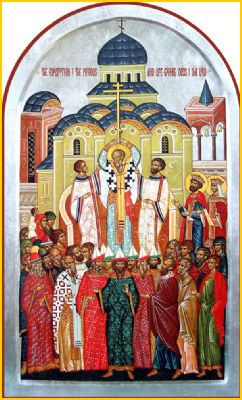|
|||
|---|---|---|---|
| This weekly bulletin insert complements the curriculum published by the Department of Christian Education of the Orthodox Church in America. This and many other Christian Education resources are available at http://dce.oca.org. | |||

The readings for the Feast of the Exaltation of the Cross give us many insights into the meaning of the cross. The "story" of the feast concerns the Empress Helen, mother of Constantine. For 200 years, pagan emperors had tried to wipe out all evidence of the places where Jesus Christ died and was resurrected. The Emperor Hadrian had been particularly determined, building a pagan temple on Golgotha. After seeing the sign of the cross in the sky, Emperor Constantine sent his mother on a quest to find the true cross, and she did so despite her advanced age. The year was 326. Nine years later, by Constantine's order, the Church of the Resurrection was built on the site of Golgotha and the Lord's tomb. The day's epistle is I Corinthians 1:18-24. Saint Paul acknowledges that the story of a God who becomes man, only to die on a cross, is "folly" to some. That is still true for some today. But it's equally true that for others, then as now, it is the opposite of folly. For believers, this story and this cross are the power of God. Paul cannot give a cogent explanation or irrefutable proof of this, and doesn't try. He only says that the "foolishness of God is wiser than men, and the weakness of God is stronger than men." The Gospel readings are from the 19th chapter of John's Gospel. Verse 7 gives the reason why Jesus was put to death--He scandalizes the Jewish leaders by claiming to be the Son of God, breaking Jewish law. The cry rings out, "Crucify him!" Pilate becomes fearful, hearing this, and asks Jesus, "Where are you from?" Who is this man with such an ability to upset people, and who is unafraid to claim divine sonship? Pilate attempts to assert his own power, and reminds the prisoner that he can either free or crucify Him. Jesus' answer shows His absolute intention to do His Father's will: "You would have no power unless it had been given you from above." By saying this He demonstrates His submission to the power, put by God into men's hands, that will lead Him to the cross. But he also refuses to absolve human beings of responsibility. He accuses those who have handed Him over of "a greater sin." They have perverted their authority, ordained by God, in condemning a righteous man. In the last painful moments of His earthly life, Jesus commends His mother to the care of the apostle John. This is a pure act of love in the midst of agony, necessitated by the death on the cross because she will be deprived of His physical care. The Feast of the Exaltation of the Cross leads us to reflect on many aspects of the cross. Most of all it calls us to gratitude for the gifts bestowed on us by Christ's willingness to accept the cross and to break the bonds of death by its power. |
|||
